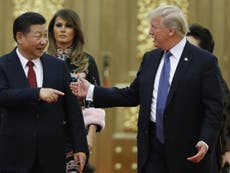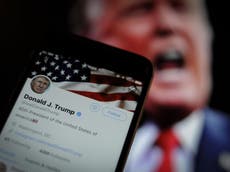Trump thinks he's done the deal of a lifetime with China. In fact he did exactly what Xi Jinping wanted
The Donald sees things only in the context of how they will play with his own domestic audience – and that means he’s got some very big diplomatic blind spots

Another day, another attempt to unravel US foreign policy.
It could of course be quite simple. After a meeting with China’s president Xi Jinping at the G20 summit, Donald Trump merrily tweeted: “China has agreed to reduce and remove tariffs on cars coming into China from the US. Currently the tariff is 40 per cent.”
The Chinese authorities haven’t commented on the social media announcement, confirming only that the two countries’ leaders had agreed that their advisers should work towards ending tariffs. It was also confirmed that no new tariffs would be introduced by either side while negotiations were underway.
On his return from Argentina, Trump was even more buoyant, describing his meeting with President Xi as “extraordinary” and suggesting in a tweet that “relations with China have taken a BIG leap forward”. Interestingly, he added that discussions had gone beyond trade, noting that “a solution for North Korea is a great thing for China and ALL!”
That flick to the situation on the Korean peninsula is notable in the current context because it should act as a reminder that Trump’s modus operandi when it comes to diplomatic matters is to be bullish, before having his heart melted by one-on-one encounters.
When it came to Korea, he met fierce rhetoric with even fiercer rhetoric – and made things personal between himself and Kim Jong-un, the nation’s “rocket man” leader. Only when it seemed as if things might get dangerously out of control did sense intervene and a summit of the two big-talking men seemed to open the possibility of a lasting deal on North Korea’s nuclear ambitions.
We are seeing the same pattern emerge with China, with Trump directing angry rhetoric towards Beijing both during his White House campaign and since entering the Oval Office. While Xi Jinping cannot match Kim in the name-calling stakes, nonetheless he is not a man to be easily rolled over and thus promised that China would retaliate against any US moves to impose trade tariffs. So it has proved, with tit-for-tat exchanges undermining confidence in the global economy.
Just as he did over Korea, however, Trump has used a theatrical set-piece apparently to rebalance a diplomatic relationship that looked increasingly fraught. The images of the US and Chinese delegations lined up facing one another, national flags a-fluttering, didn’t seem full of promise – but if you believe his Twitter feed, the Trump charm has paid off once again.
Indeed, to Trump supporters, the seeming rapprochement between the US and China is evidence of his diplomatic brilliance; his ability to do a great deal when the odds seemed stacked against him. It is said Trump fancied a Nobel Peace prize for his work to ease Korean tensions; he might want an economics medal for his latest brilliance too.
But it is one of the consequences of an America First approach that Trump sees things primarily – perhaps only – in the context of how they will play with his own domestic audience. What is lost is that the motives of his diplomatic opponents are not simply about upsetting Americans or antagonising the man in the White House (who could in any event be antagonised by Mary Poppins).
Rather, they have domestic concerns and imperatives of their own. Kim, for his part, needed to prove his mettle while at the same time finding a way to improve relations with South Korea that didn’t cause him to lose face. He achieved that handsomely, to the extent that Seoul is now actively arguing in favour of easing sanctions against the North.
Likewise, Xi has faced claims that engaging in a trade war is adding to the problem of a sluggish economy back home. He needed, therefore, to cut a deal; for now at least, while China takes stock. A 90-day hiatus suits Xi arguably more than Trump, who knows that his base support would be happy for the trade war to be ramped up, rather than dampened down (even if the stock market’s reaction to the deal shows that financiers in the US have welcomed it).
As with Korea, it remains to be seen whether America’s improved relationship with China is a lasting state of affairs. Though you wouldn’t know it to listen to the White House that depends as much on the domestic and economic needs of the men in power in Pyongyang and Beijing as it does on President Trump.




Join our commenting forum
Join thought-provoking conversations, follow other Independent readers and see their replies